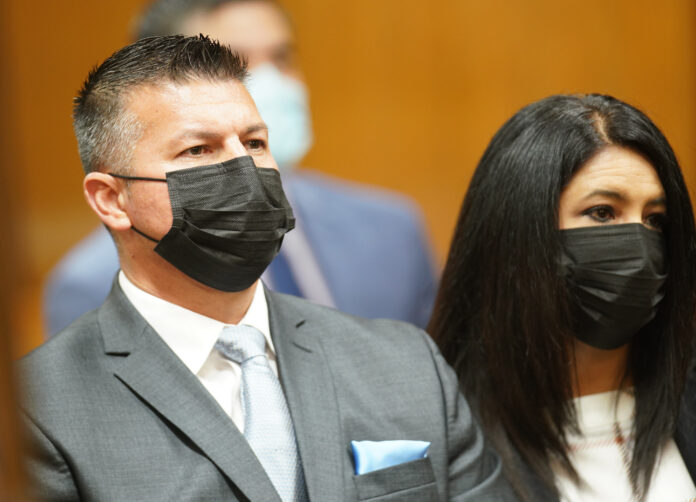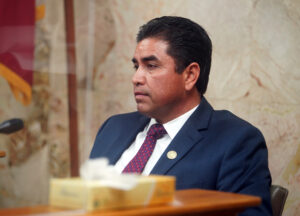
Edinburg Mayor Richard Molina’s attorney made his case during an all-day, in-person hearing Monday as to why a visiting judge should remove District Attorney Ricardo Rodriguez Jr. and his office from prosecuting the voter fraud case against the elected official.
Testimony throughout the day probed Rodriguez’s familial relationships, including one with the person who initially filed the voter fraud complaint with the Texas Secretary of State’s office against Molina after he was elected in 2017. That person is former Hidalgo County Justice of the Peace Mary Alice Palacios, Rodriguez’s aunt.
Cross examination during the hearing also elicited testimony from a politiquero who admitted that the FBI questioned him about Molina, the mayor’s relationships and about a pay-to-play scheme.
That agency does not confirm or deny the existence of investigations.
The district attorney, his aunt and former city councilman David Torres testified, as did several other witnesses.
Molina was indicted on 11 counts of illegal voting and one count of engaging in organized election fraud.
He has pleaded not guilty to the allegations and has maintained his innocence since his arrest, claiming the charges are retaliation for him being elected to office by political players in Hidalgo County who lost lucrative contracts and positions after he was elected.

Visiting Judge Carlos Valdez indicated he would make a ruling on the motion to disqualify Rodriguez Tuesday morning.
During the Monday hearing, Molina’s attorney, Carlos A. Garcia, placed those arguments in the hands of the visiting judge as he sought to have Rodriguez removed from the case, arguing a conflict of interest.
While questioning Rodriguez, Garcia asked about whether he had any involvement in his aunt’s complaint with the secretary of state, to which the district attorney said he had none. The attorney also asked Rodriguez why he remained on the case against Molina but handed a separate complaint of voter fraud against members of his family to the Secretary of State’s office. Garcia also questioned why Rodriguez didn’t appoint a special prosecutor in the case.
That second complaint was filed with Rodriguez by Dalia Molina, the mayor’s wife.
She was indicted on a single count of engaging in organized fraud and two counts of illegal voting and has pleaded not guilty.
While on the stand, Rodriguez said he had the discretion not to appoint a special prosecutor and decided to pass the complaint to the Secretary of State’s office.
“I didn’t want to touch it,” the district attorney said about the complaint the mayor’s wife filed.
On cross examination, prosecutor Michael Garza indicated during questioning that the complaint made its way to the Texas Attorney General’s office, which made no finding on the complaint.
Garcia also questioned Rodriguez about Edinburg’s former mayor, Richard Garcia, who lost his re-election to Molina in 2017.
The former mayor is Terry Palacios’ law partner. He is also Rodriguez’s uncle and Edinburg’s longtime municipal judge.
The defense attorney asked Rodriguez whether the former mayor or the municipal judge ever assisted him financially while he went to law school, which the district attorney denied.
“I wish they would have paid my loans,” he said.
Mary Alice Palacios was the last witness of the day and Garcia pressed her on whether she had spoken with Rodriguez about the complaint against Molina and about whether he or anyone else assisted her in compiling a binder of allegations against Molina that she submitted to the Secretary of State’s office. The defense attorney also questioned her on how she knew the procedure for filing such a complaint.
She said she used Google to find out how to submit the complaint and that she conducted the investigative work for the complaint on her own and without assistance.
Molina and his attorney have asserted that Mary Alice Palacios filed the complaint against Molina because she lost a lucrative insurance contract she had with the city after he was elected.
“Mary Alice Palacios had an axe to grind with my client,” Garcia said.
He also expressed skepticism that she had no help in her investigation that resulted in the complaint to the Secretary of State, which eventually took the form of the indictment against the mayor.
“I think that credibility is questionable,” Garcia said.
There was also testimony that centered around a 2015 meeting at Rodriguez’s home where Molina, Terry Palacios and other Palacios family members were present, which Torres, the former city councilman, said was about talking politics and improving communication.
“It was about an effort to work together,” Torres said.
At the time, Molina was a city councilmember.
Then there was testimony from Miguel Angel Garza, a well-known politiquero whose home was raided by the FBI Feb. 24, 2020, and has had several DWI arrests, including a felony DWI arrest.
Miguel Angel Garza has not been charged in relation to that FBI raid and under questioning by Garza, the prosecutor, he denied that he was cooperating with an FBI investigation into Molina.
The politiquero claimed that he was invited to a party at the district attorney’s house in 2015 where he heard Rodriguez and other Palacios family members looking for an opponent to beat Molina, which the prosecutor pointed out apparently happened long before Molina even ran for mayor.
Molina is currently up for re-election and is locked in a runoff race with former Edinburg City Manager Ramiro Garza, a point Molina’s attorney also hammered home.
Prosecutors in the case filed a motion to set a jury trial a week before early voting in the general election, which Garcia, Molina’s attorney, has characterized as an effort to undermine the election.
However, Garza, the prosecutor, again pointed out that Molina did not have a trial date or any settings in his case because of the pandemic and that the motion’s filing followed a ruling by the Hidalgo County Board of Judges that has allowed jury empanelment for trials, which ground to a halt at the onset of the pandemic in March 2020.




